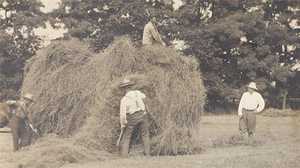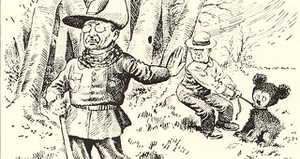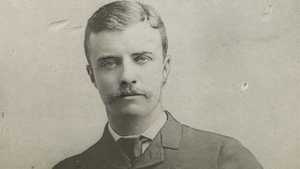John Cooper on Theodore Roosevelt
Historian John Cooper comments on aspects of Theodore Roosevelt's career.

The Rough Riders
TR's cavalry company, the Rough Riders, somebody once called them "cowboys and bluebloods." They're drawn almost equally from out West, from Texas, Arizona, the Dakota territory, some of them have been sheriffs. They've been cowboys. You know, that's the image of them.
But you've also got a number of them who are Harvard athletes, Yalies, often they played polo or they've ridden to the hounds. So you've got those two sides in there. And that's what made them so interesting to the press. How this combines... And TR's very conscious and very proud of that, very proud of how he puts them together and he's especially proud of how "his kind," that is, these bluebloods from the northeast hold their own so well with the tough guys from out West.
Theodore Roosevelt was attracted by the grim side of war. It was the danger, the squalor, the physical combat, the possibility of being killed, the possibility of being seriously wounded. In fact, one of the things that he regretted, it seems very odd, was that he was never seriously wounded. I think he would have rather liked to have come back with missing an arm or missing a leg or some very prominent scar, something like that to prove this. Now he is a genuinely brave man. He risked his life, countless times going up San Juan Hill. I mean he -- and not unnecessarily either and he's not a man who exposes his troops unnecessarily, to danger. He's not a showboat commander in that way, but he is somebody who's -- he's genuinely brave. He's a genuinely inspiring leader. His pride in his role in the Spanish-American War was really justified.
The Progressive Party
The 1912 convention is one of the truly great shows of American politics because here you have Theodore Roosevelt, the ex-president who has challenged the president for the nomination. It's not clear who's going to get it. There are about -- well, there are a lot of delegates that are contested. So and really who gets nominated is going to hinge on who gets how many of these delegates. The party bosses, controlled in the interests of President Taft, award just about all of these delegates to him. It's a steal. It's an absolute steal. It infuriates the Roosevelt supporters. They denounce it. They walk out. It's a wonderful show.
It's more show than substance, though, because even if the conservatives had acted with much more finesse and done it more carefully and with more of an appearance of fairness, Theodore Roosevelt had already decided that if he didn't win that nomination, he was going to walk out of the convention and he was going to start a new party, which is exactly what he does, he and his supporters do.
What he is doing in leading the Progressives in 1912 is laying out what he believes is the correct approach to reform, to handling not only the trust problem, but basically how the country ought to be led, what kind of leadership we ought to have, how we ought to practice democratic politics in the 20th century in a complex industrial society, in a nation that's a great power, how we ought to be doing these things. I mean he's exposing his -- the ideals behind his thinking.
Trust-Busting
TR becomes president at a time when business is going through tremendous consolidation. This is the era of trust forming. It's amazing how many consolidations and how much money is involved. It had even been embarrassing that his inauguration as vice president had been the same day the U.S. Steel, the formation of U.S. Steel had been announced, the first billion-dollar business in the world. And something in it -- the symbolism of that wasn't quite right, that the business in a sense was overshadowing the government.
Theodore Roosevelt actually liked big business. He thought that the growth of big business was very healthy, that most of the businesses got there because they were efficient and the businessmen were doing their jobs right. But two things bothered him. Two things bothered him most about it. One was just that idea that they were overshadowing the government, that some of these tycoons, such as J. P. Morgan, could presume that they were sovereign equals of the U.S. government.
For example, when the first big anti-trust suit under Roosevelt was brought, which was against Morgan's railroad combine, Morgan said, "Send your man to see my man and tell him to fix it up." Roosevelt's answer to that was, "That can not be done. Nobody treats as a sovereign equal to -- of the President. No company can presume to be -- no private interest can presume to be equal to the government. The government must be superior to all of these."
Conservation
Conservation is the one real cause for Theodore Roosevelt when he first becomes President. It is the only thing in domestic affairs where he gets out in front of the public and even of reformers.
And for him, it really is a moral issue because he believes that we humans are stewards of the environment and what we have to do is take the longer view, not use up the resources, because if we use them up now, they will not be here for our children. And we have to pass this estate on. We have to take a longer, longer view.
Plus his anti-materialism comes into this, too. This is somebody who, ah, believes that there is something. It's not necessarily mystical or religious exactly, but there is a reverence for Nature. There really is that strain in him.
So that this is -- it's interesting. This is where he goes out front. He's not following. He's not playing it cautiously. With his party and his party bosses, he's really willing to push this one and agitate the issue. And it's the only one in his first term that he's willing to do that with.
The 1912 Campaign
Nineteen-twelve is the race of the three presidents: past president, current president, future president. The past president is Roosevelt. Roosevelt stands for his new nationalism, this vision of transcendent idealism, of reform essentially reform from above to maintain social order and the health of the nation.
Taft is the traditional Republican. He's for a certain amount of limited reform, but basically pro-business, not go too far, very careful rule of law. He stays in the race, frankly, because he knows he hasn't got a chance, but he wants to spoil it for Roosevelt. He wants to make sure Roosevelt doesn't win.
Wilson represents, I think, the most articulate of modern liberals. He wants something -- he wants an activist government that's going to promote economic competition, going to promote economic opportunity. It's the beginnings of the welfare state. So you've got reformed conservativism in Roosevelt, you've got traditional conservativism in Taft, and you've got modern liberalism in Wilson.
The big issue in 1912, the one that gets the most attention, is trusts. This is where Roosevelt and Wilson clash head-on. Roosevelt's position is regulate the trusts, that the problem is not the size of businesses, it's their conduct and you've got to regulate them. Wilson stands for very careful government watchdog and supervision of the economy, quite often breaking up the trusts, but for him the most important thing is to make sure that fresh competitors get in there. He wants to keep the market open. So you've got Roosevelt, the regulator, Wilson the marketeer, open, but keep the market open. It's their very different visions. They both believe in a very strong activist government role in that.
Taft, if anything, is probably the most of a traditional anti-truster. He believes that the anti-trust laws really are -- they ought to be enforced, perhaps not that often, but you've got to be careful about making sure that business obeys the law.







